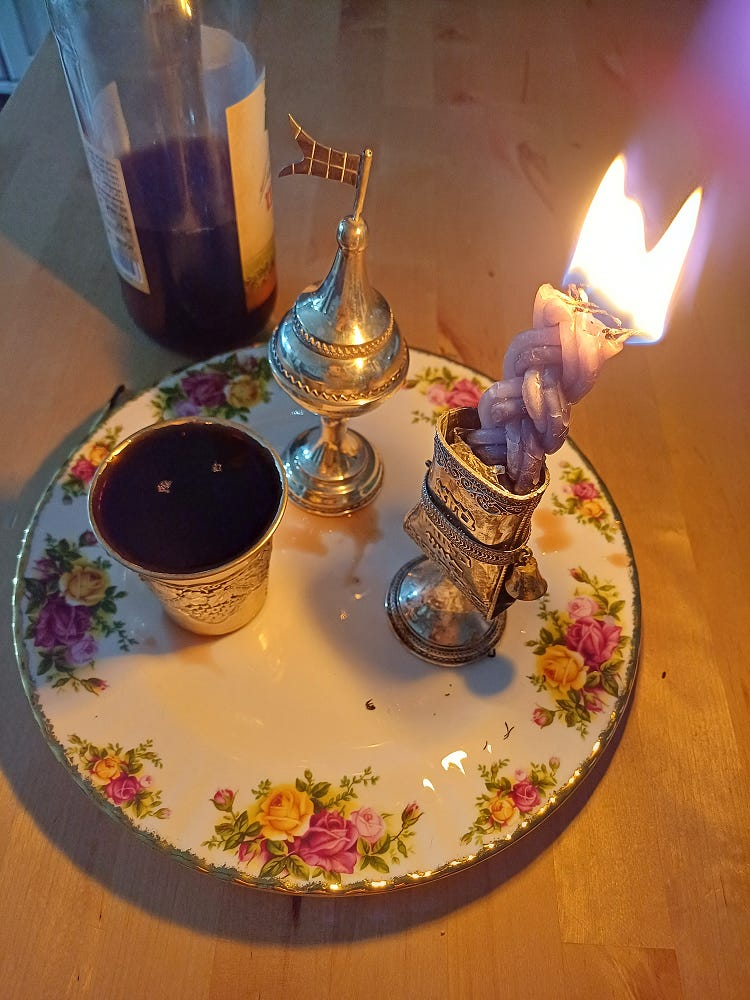Everyday Gifts
A story for children 7-12 about learning to see the world around them.
This story is based on a story my grandmother told me about when she was a child in the Ukraine, around 1890. She lived in the city of Kiev, but the family had been visiting relatives in a shtetl—a small Jewish village—outside the city for the Sabbath. A child who is unfamiliar with the Jewish Sabbath might benefit from hearing last week’s story, Mercy’s Hanukkah Visit, in which she explains what she learned about the Sabbath (as well as about Hanukkah), before hearing this story.
The door flew open with an icy blast as Grandfather and Father came back from synagogue. “Sabbath is over. It’s time for Havdolah,” said Grandfather. Malka cradled the spice box in both hands and set it next to the braided candle.
“Grandfather, will you spill the wine tonight?”
“Always!” he replied. “The overflowing cup reminds us that the specialness of the Sabbath overflows to the week.”
Weekdays didn’t feel special to Malka. They felt boring. But as she waited for the blessing on spices, she danced from foot to foot. The zippy scent of cinnamon and clove was a happy goodbye to a wonderful day.
After Grandfather said the last prayer, Malka doused the candle in the spilled-over wine. “Good week, good week!”
Grandmother handed Malka her heavy coat. Malka sighed. “I wish every day was the Sabbath. During the week, no one has time for stories or fun.”
“The week is special, too.” Grandmother patted Malka’s cheek. “Look carefully and you’ll see many small gifts from God. Next time I see you, tell me what you saw.”
Grandma and Grandpa hugged everyone and Father rushed outside to ready their horse and sleigh. Grandmother tucked Malka’s scarf tighter around her neck. “Remember, look for God’s little everyday gifts,” she whispered.
Malka scrunched her forehead. Little gifts? What did Grandmother mean, look for them?
Malka and Mother climbed into the sleigh and snuggled under bearskins. Father climbed onto the driver’s seat and snapped the reins. The horse trotted down the lane, out of the village, and onto the forest road toward home.
Malka pushed out her bottom lip and crossed her arms. What could she see in the dark forest?
But…
The full moon shone off the white snow, making the night sky deep, deep purple. In the moonlight, leafless trees swayed in the wind like dancers, and snow sparkled like storybook diamonds. An owl, on silent wings, swooped right over the sleigh, so close that Malka gasped. The clink-clink of bells on the horse's harness and the whoosh of the sleigh's runners on the packed snow made a soft song. The cries of wolves whispered from far away.
Suddenly Malka saw a wolf in front of the trees near the road. It raised its head as the sleigh passed, and for a moment it stared right at Malka. Then it dashed across the road into the forest.
Malka sat back and pulled the bearskin close. Were the owl and the wolf Grandmother’s everyday gifts? What about the sparkling snow and the dancing trees? The quiet songs of the night?
Then she thought of Grandfather’s stories. So many seemed strange and wonderful! She imagined being a grandmother telling stories. If she said she stared into the yellow eyes of a wolf, would anyone believe her?
Maybe the best stories came from noticing life’s little things.
Yawning, she wondered about the new week. She would see many amazing things when she truly looked. Maybe some of them would make wonderful stories.
She snuggled back under the bearskin, watching the forest until at last her eyes closed and she slept.
For Parents, Teachers, and Others
A Brief History of Jewish Time
The traditional Jewish concept of time is different than that of many other cultures. We in the west think of time in a linear fashion, as though it is a train track. Historical events happened at stations along the way. Today is far away from this date in 1900 and much farther away from the same date in 1066; the Magna Carta is almost lost in the mists of time. Not only years are different: in the west, days begin at 12:01 AM and end at 12:00 PM.
Jews see time as a spiral, like an old-fashioned slinky toy, with each circle one year. Events that occur along a year radiate upward through the circles, sending emanations into the current year. I believe this is one reason we Jews still feel so connected to our leaders from the past, and why we talk about arguments that occurred between scholars 2000 years ago as though they happened yesterday. Our days begin and end when three stars come out, 18 minutes after sunset. We count days this way because darkness preceded the creation of light. As the Torah says, (Genesis 1:2-3)
2 Now the earth was astonishingly empty, and darkness was on the face of the deep, and the spirit of God was hovering over the face of the water.
3 And God said, "Let there be light," and there was light.
Hebrew Pronunciation
There are two major pronunciations of Hebrew, depending on where the Jews using it lived for most of the last 2000-2500 years.
Ashkenazi Jews are those who, before the Holocaust, lived in most of Europe and the former states of the USSR. Most of those Jews were killed in the Holocaust; most of the rest settled in the Americas or Israel. Their spoken language was mostly Yiddish, a combination of Hebrew, old German, Russian, and Slavic.
Sephardi Jews lived in Spain and Portugal. Some of them were descended from Jewish merchants who settled along the Mediterranean coast more than 2000 years ago; many were descended from Jews who were taken by the Romans as slaves in the year 70 CE, where they lived and flourished until the Inquisition, when they were forced to convert to Catholicism or to leave Spain (in 1492) and Portugal (in 1497). Most of them settled in the Balkans, Turkey, and North Africa. Their spoken language was mostly Ladino, a combination of Spanish and Hebrew.
Mizrachi Jews are those whose ancestors never left the Holy Land and those descended from Jews exiled to Babylon around 586 BCE. They lived primarily in what are now the eastern-most states of the former Soviet Union, Iraq, Iran, Afghanistan, and Pakistan. Jews in Pakistan mostly fled in 1947, when Pakistan was separated from India and designated a Muslim country. Most of the rest were expelled from their homes when Israel was founded. Iran was the exception; but the majority Jews left Iran at the Islamic Revolution in 1979. Many of them came to Israel.
Ashkenazi Jews, the majority of Jews in the United States, use the Ashkenazi pronunciation. Sephardi and Mizrachi Jews use the Sephardic pronunciation, the pronunciation used in Israeli everyday speech and even in many Israeli synagogues that use an Ashkenazi prayerbook and melodies.
The major differences in pronunciation between the three are the vowel sounds. However, one consonant has two very different pronunciations: the letter ת . In Israel it is called “taf” and pronounced “t,” although some people use a softer ”t” sound. In Ashkenazi pronunciation it is called “saf” and is pronounced “s,” although purists pronounce it with an almost-lisp so it sounds almost like “th” or a hiss. Another letter, tet, ט , always makes the sharp “t” used in English.
This is relevant here because this story is about the Sabbath. The word Sabbath is spelled שבת in Hebrew. It has two pronunciations. The Ashkenazi pronunciation is Shabbos. The Sephardic pronunciation is Shabbat.
The Sabbath and Havdolah
God created the world in six days and rested on the seventh. We Jews are tasked with emulating God to the best of our ability, which includes doing our creative work on six days and resting on the seventh, the Sabbath. The Sabbath has a very special holiness that, if a person keeps it carefully, they can sometimes actually feel. You can read about the Sabbath in the story Mercy’s Hanukkah Visit.
At the end of the Sabbath, when that specialness leaves, there is a bit of a let-down. Havdolah is a very brief ceremony that marks the end of the Sabbath and the transition to the rest of the week. Blessings are made over a cup of wine, something with a lovely scent, and a candle with two or more wicks. In different places difference scented things were used; the most common to American Jews is spices, often cinnamon and clove, which are kept in a special box or holder. In Israel today, scented leaves from a shrub or aromatic herbs are often used.
As the story explains, many people overfill the wine cup to represent the blessings that we hope will overflow into the week. The spices are to lift our spirits that are depressed because the holiness of the Sabbath is leaving. The braided candle represents the lights that can now be kindled, since during the Sabbath we are not allowed to kindle lights. The whole ceremony takes just a very few moments.
Questions about the Story
Why does Malka think the week is boring?
The grownups are busy with every-day tasks of housekeeping and earning a living, while the children are in school and doing chores.
On the Sabbath the family visits family and friends and plays games together. They have fancier meals and might sing songs around the table. Parents have time to talk and tell stories to the children.
Why is this the first time Malka has noticed things like the dancing trees, the sparkling snow, the owl and the wolf?
We usually look at things while thinking about other things, so we don’t really see.
Malka has looked without noticing. But after thinking about her grandmother’s words, she focuses on what is in front of her instead of just living inside her own head.
Is it important to see the little things? Why or why not?
Life is richer when you pay attention to things beyond yourself.
When we “live in our heads,” we often are thinking about ourselves and worrying about the future. It is very common to look at the world and impose our thoughts and worries, or lies we have been told, on what we see. This can make us almost hysterical, as Greta Thunberg was in her famous speech at the UN. Looking for the little things without imposing our thoughts, on the other hand, can be relaxing.
Seeing something beautiful (a hummingbird, a flower pushing up from cracked city cement) while in a bad situation can give one hope.
Seeing interesting, unusual, or beautiful little things gives us an opportunity to thank God for them.
Feeling gratitude, including to God, is associated with happiness.




